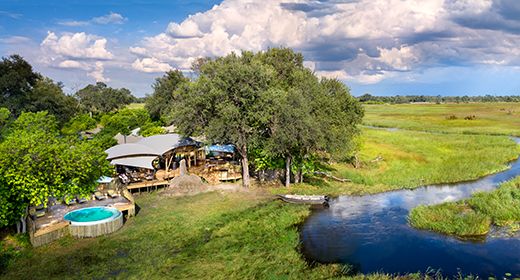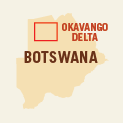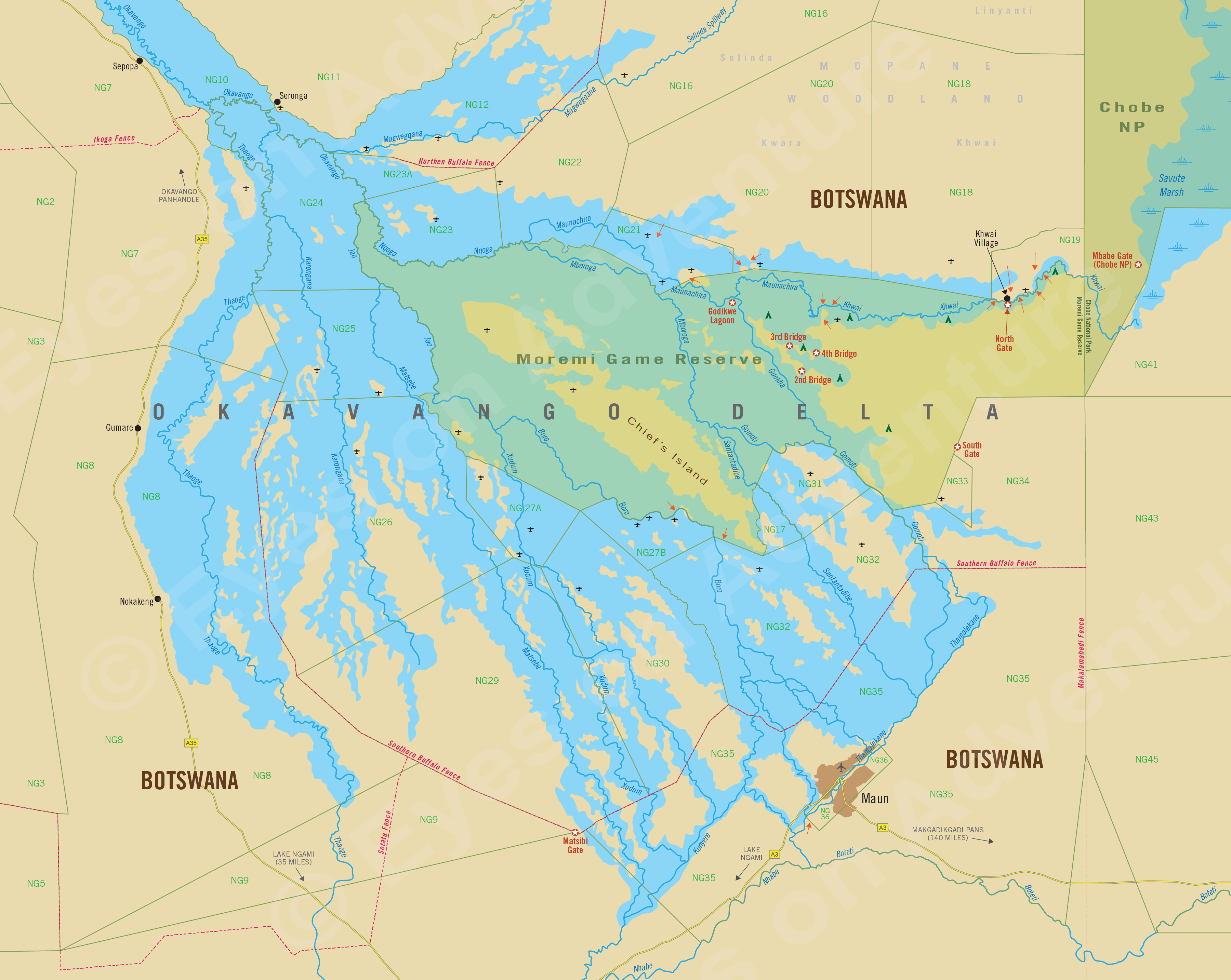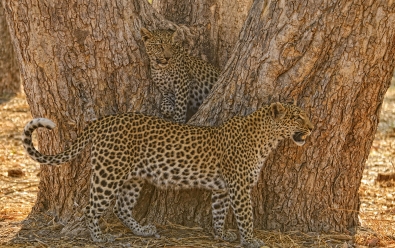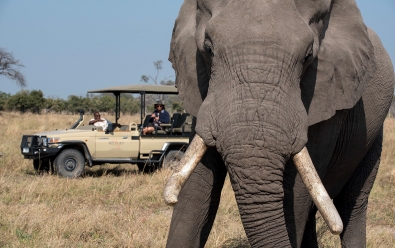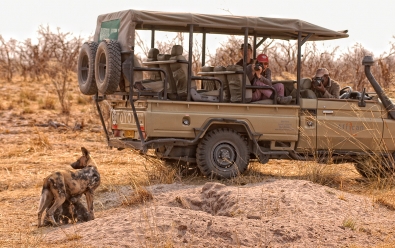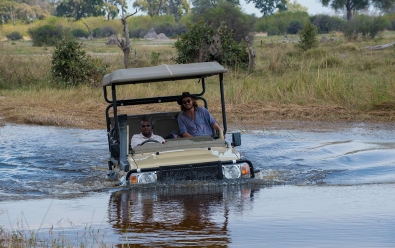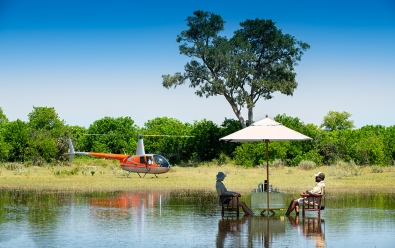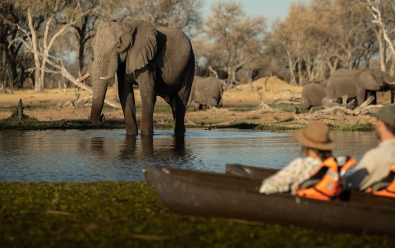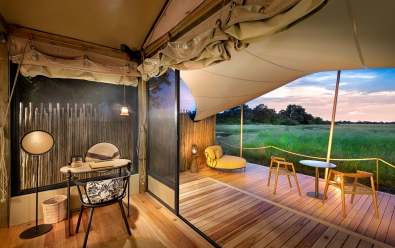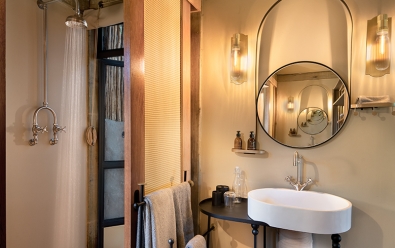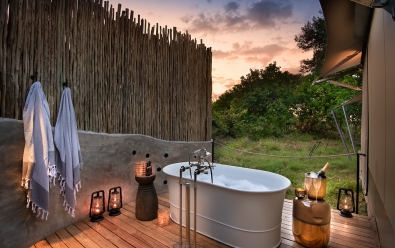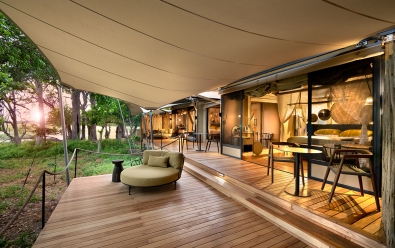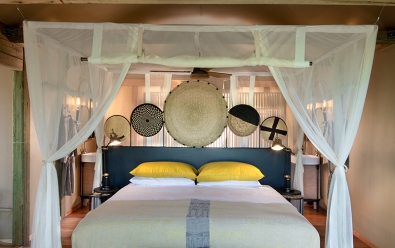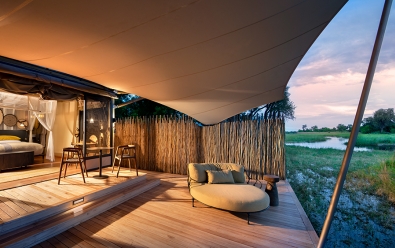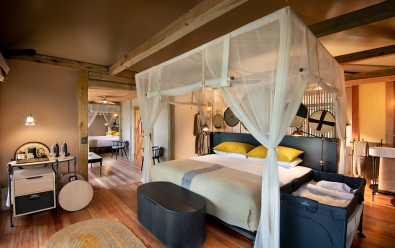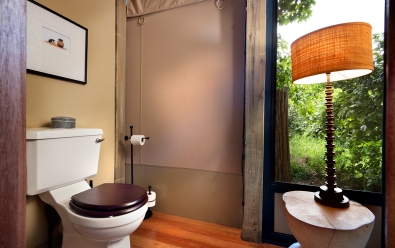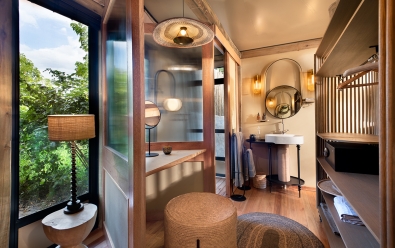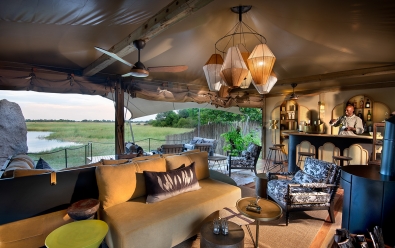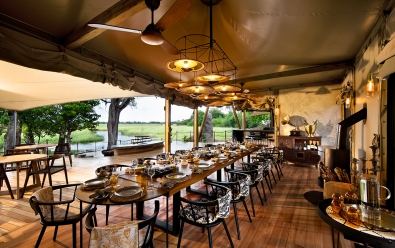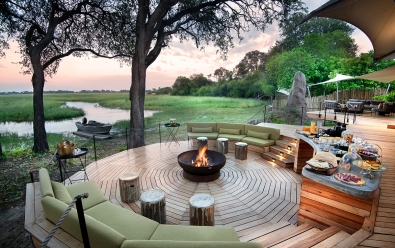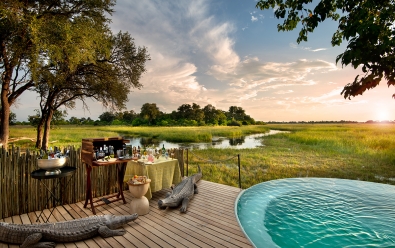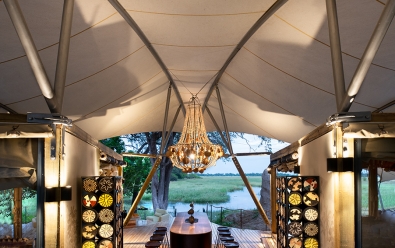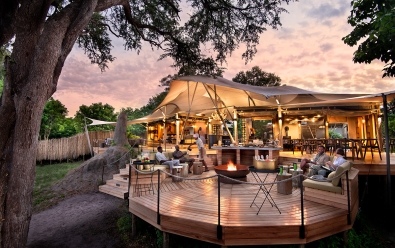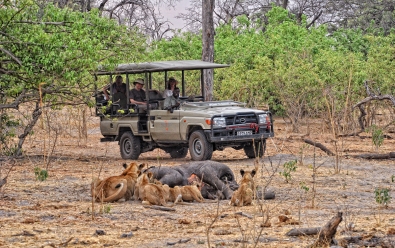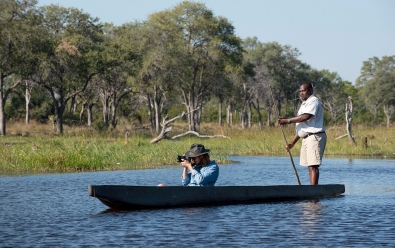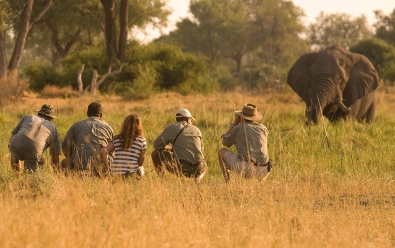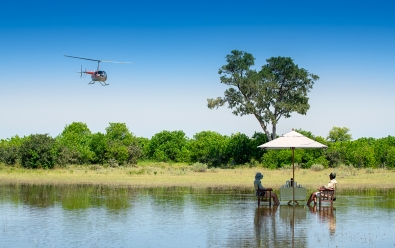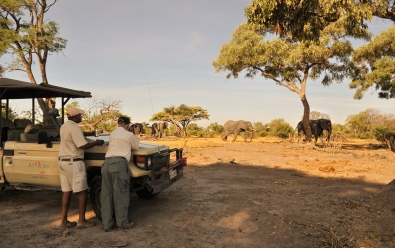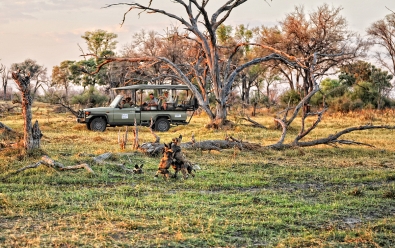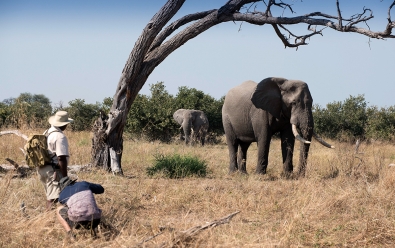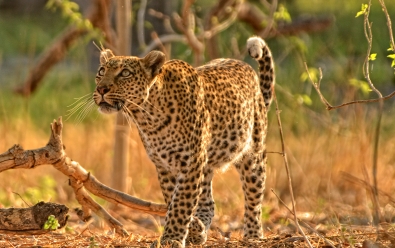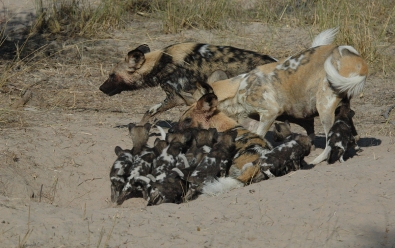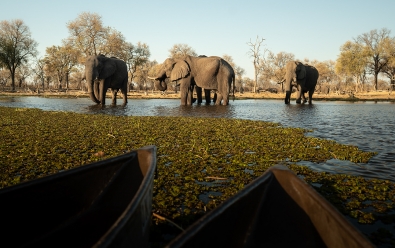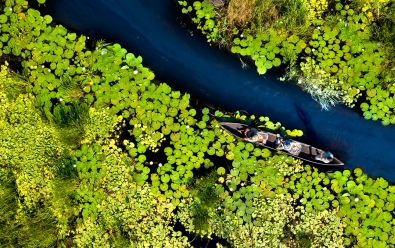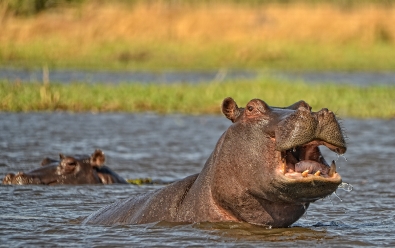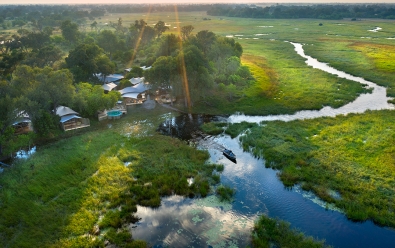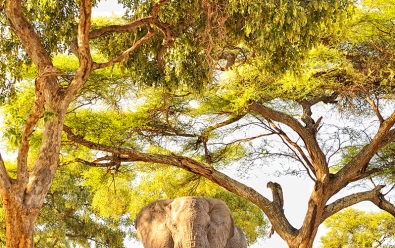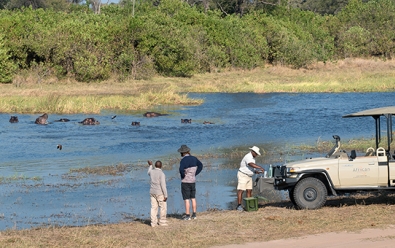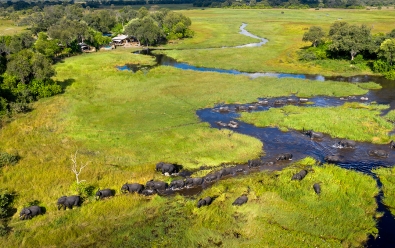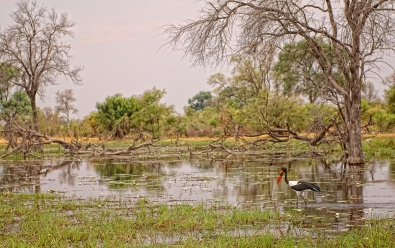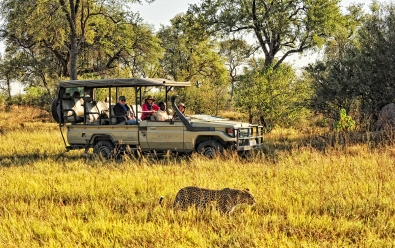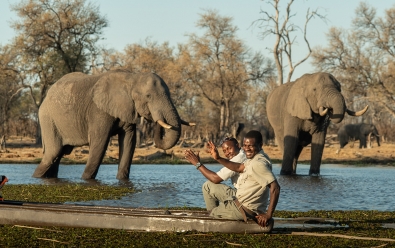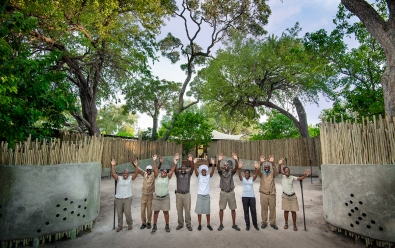Khwai Leadwood Camp
Inquire for lodging prices
Highlights
- Located along a beautiful, permanent waterway that attracts wildlife.
- Good wildlife viewing all year, but especially during the dry season.
- Dat and night safari drives, mokoros, bush walks, scenic helicopter, culture.
- Game drives can access the Moremi Game Reserve.
Location
- NG19 Private Concession
- Northern Okavango Delta
- Northern Botswana
Khwai Leadwood Camp is located in a private concession along the northern border of the Moremi Game Reserve and offers exceptionally good wildlife viewing throughout the year.
The camp is located within the private, community-managed, Khwai Concession, which is located in the northeastern Okavango Delta, very close to the border of the Moremi Game Reserve, which is well-known for offering some of the best wildlife-viewing in Africa.
Guests staying at the camp will enjoy safari activities on both the private concession, as well as in the Moremi Reserve.
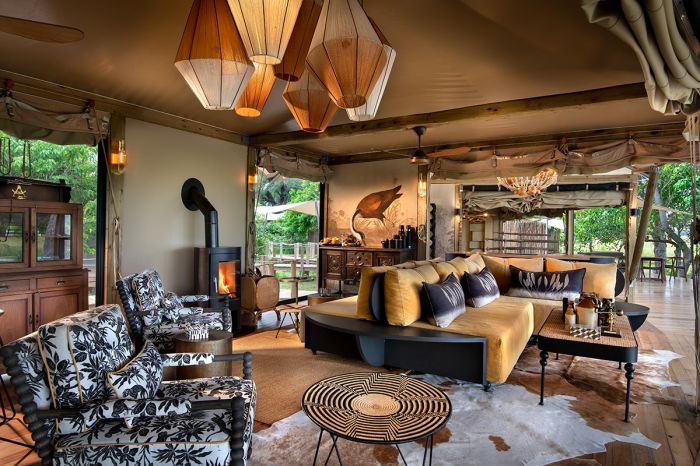
Main area lounge at Khwai Leadwood Camp.
The camp is situated on the banks of the Khwai River, which delineates the northern border of the Moremi Reserve, and attracts an abundance of wildlife throughout the year, but especially during the dry winter months from June thru October. The river attracts a variety of wildlife, particularly elephants, which are often seen swimming and frolicking in the river, and there are plenty of hippos that make their home in this permanent water source.
Predators are seen regularly around the camp, including lion, leopard, spotted hyena, and sometimes cheetah. The area around the camp is particularly good for sightings of the endangered African wild dog, which are always entertaining and a favorite species amongst safari enthusiasts.
Other species commonly seen around the camp include buffalo, giraffe, red lechwe, greater kudu, impala, zebra, blue wildebeest, tsessebe, warthog, and jackal. Birdlife is prolific and incredibly varied, with both water-based birds and dry-land species and anyone with an interest will likely 'tick' over 100 species in a day.
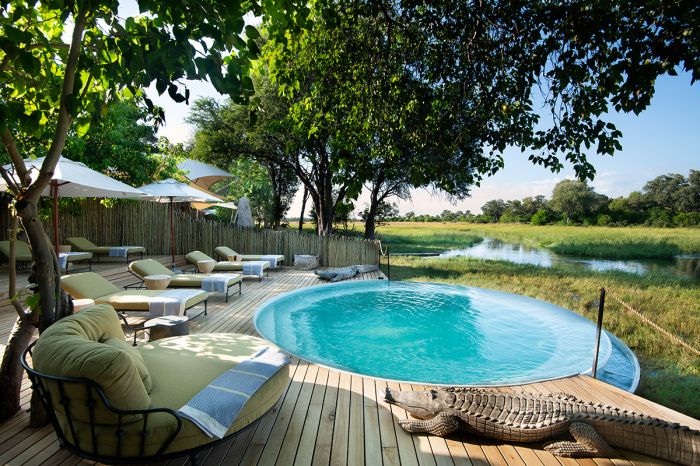
Main area pool and sundeck at Khwai Leadwood Camp.
The Khwai River, which in the northernmost permanent channel in the Okavango Delta, is the focal point for the camp and wildlife can often been seen from the camp's main area or from the guest suites. Guests at Khwai Leadwood may choose from a variety of activities, including game drives in customized, open-sided Land Cruisers, water-based excursions on the traditional 'mokoro' (a long canoe propelled by a 'poler' guide who stands at the rear), nature walks, and scenic helicopter flights to see the area from above. Cultural visits to meet the local people in the nearby Khwai village are also highly recommended.
The camp has six luxurious, canvas-and-wood, safari-suites and one two-bedroom suite that is perfect for a family with children or even two couples traveling together. The spacious suites offer comfortable beds (twin or double setup), an outdoor deck overlooking the river and floodplains, and fully-plumbed facilities with both indoor and outdoor showers, bathtub, wash-basin vanity, and flush toilet.
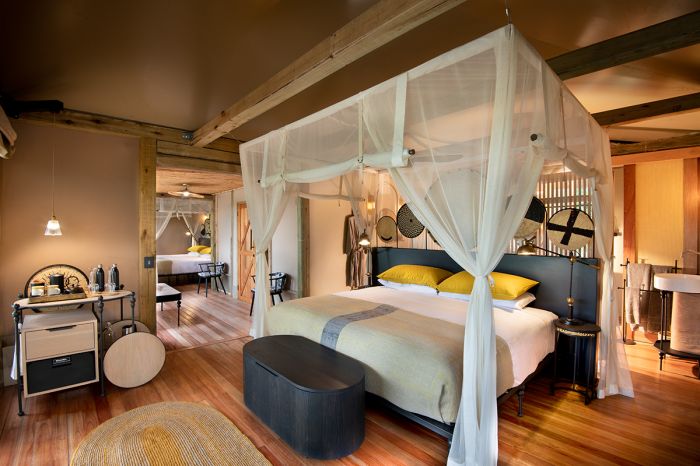
The two-bedroom suite at Khwai Leadwood Camp.
The main guest area is built on an elevated wooden deck and includes a wood-and-canvas structure that features a comfortable lounge, dining area, bar, and coffee/tea station. The lounge and dining areas open into a front viewing deck with lounge seating and a campfire area, both of which afford excellent views over the river and are great spots for watching wildlife.
A relaxing plunge pool and sun deck is located adjacent to the lounge and offers a great way to spend some of the midday hours between safari activities. A traditional 'boma' is often used for dinners under the stars or just for evening drinks around the campfire.
The camp operates primarily on solar energy, but a generator provides a backup power source and there is 24-hour electricity in the guest tents and the main area.
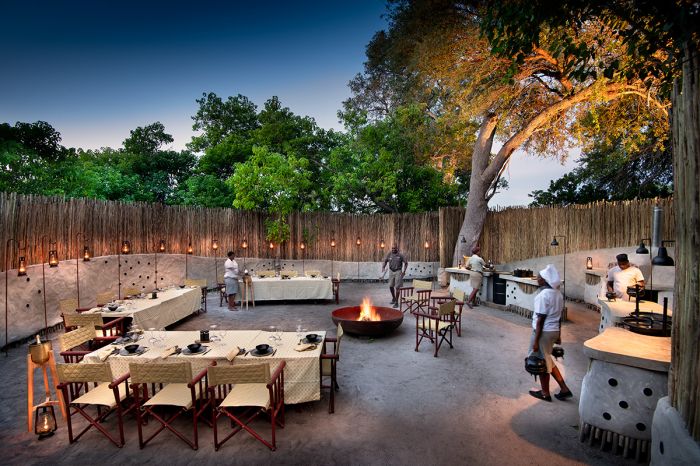
Outdoor dinner setup in the traditional boma at Khwai Leadwood Camp.
Khwai Leadwood Camp is owned and operated by African Bush Camps (ABC), a company founded by a professional African safari guide, who has a passion for protecting remote spaces and the wildlife that lives there.
African Bush Camps owns safari camps in Botswana, Zimbabwe, and Zambia. The ABC camps are fully sustainable, with minimal impact on the environment. The African Bush Camps Foundation runs local projects that empower the local communities wherever they operate safari camps. The company's aim is to conserve and preserve wildlife and natural areas in Southern Africa.
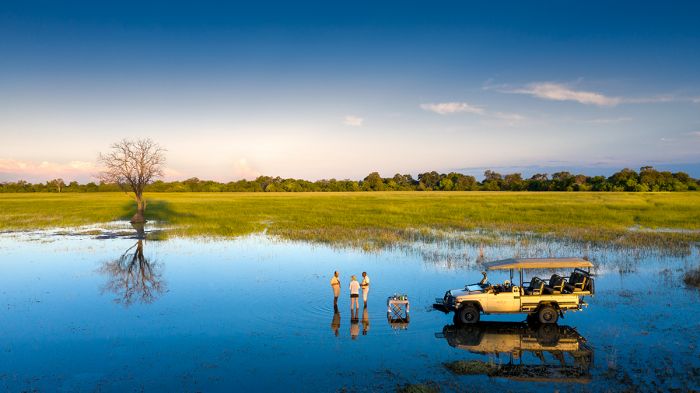
Refreshment stop during a game drive at Khwai Leadwood Camp.
About the Okavango Delta
The Okavango Delta is one of Africa's greatest safari destinations and offers an incredible diversity and abundance of wildlife. The Okavango is an UNESCO World Heritage Site as well as a Ramsar Wetland of International Importance.
Often referred to simply as "the Delta", the Okavango is characterized by an ever-changing network of waterways that originate far to the northwest in the highlands of Angola. The Cubango River flows into northern Botswana and spills into the flat expanse of Kalahari sands, where it fans out into a shallow trough formed by tectonic faults beneath the sand.
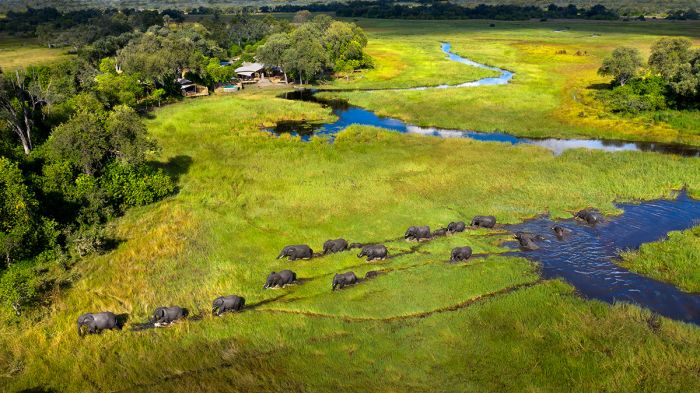
Elephants crossing the Khwai River with Khwai Leadwood Camp on the riverbank.
The annual 'flooding' of the Okavango brings in rich sediments that provide nutrients atop the sands, which in turn creates a diverse ecosystem of permanent and seasonal waterways, deep-water lagoons, papyrus beds, palm-covered islands, seasonally flooded grasslands, and woodlands. The rich fresh-water environment changes year-to-year depending on the level of the floodwaters making it one of the most dynamic wildlife destinations on Earth.
Wildlife in the Okavango Delta is diverse and includes all of Africa's Big Five animals (lion, leopard, elephant, rhino, and buffalo. Commonly seen herbivores include giraffe, plains (Burchell's) zebra, blue wildebeest, impala, tsessebe, common reedbuck, greater kudu, waterbuck, buffalo, elephant, and warthog. Both species of rhino are found, albeit in small numbers. The Delta is also home to red lechwe and sitatunga, both of which are water-dependent antelopes.
The abundance of herbivores means that predators are common in the Okavango. Commonly seen species include lion, leopard, spotted hyena, black-backed jackal, and African wild dog. Cheetah are sometimes seen in the larger grasslands like those on Chief's Island. Less frequently encountered predators include serval, caracal, honey badger, and various species of mongoose.
The abundance of water in the Okavango provides habitat for Nile crocodiles and hippos, both of which are seen easily at any of the safari camps located near the Delta's permanent water. Primates in the Delta include chacma baboon, vervet monkey, and bush baby (galago).
Birding is outstanding in the Delta, with over 400 species possible. A typical safari day can easily produce over 100 species for an avid birder.
ROOMS INCLUDES & EXCLUDES CHILDREN FACILITIES ACTIVITIES
Accommodation
7 guest accommodations in total comprising:
- 6 twin-bedded, wood-and-canvas, luxury tented-suites, each with two three-quarter beds and an outdoor deck with lounge seating. The beds can be converted to a double bed on request.
- 1 two-bedroom, wood-and-canvas, luxury tented-suite. Each bedroom has two three-quarter beds that can be converted to a double bed on request. Each bedroom has its own fully-plumbed facilities, including an indoor shower, outdoor shower, single-basin vanity, and flush toilet. The master bedroom also has a bathtub. The bedrooms share an inter-leading entrance/foyer and an outdoor lounge-deck.
All the guest suites feature fully-plumbed, en-suite facilities that include an indoor shower, outdoor shower, single-basin vanity, and a flush toilet.
The guest suites are constructed atop slightly-elevated , wooden platforms with sand footpaths leading to the main camp area.
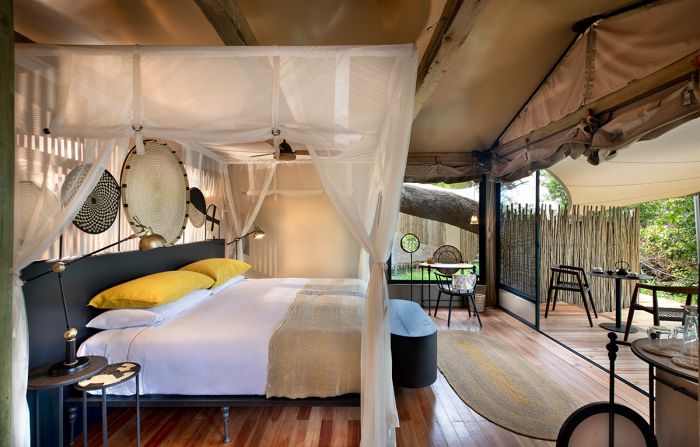
Guest suite interior at Khwai Leadwood Camp.
Other items and features in the guest suites include:
- Mosquito netting over the beds.
- Pedestal fan.
- Writing desk and chair.
- Outdoor veranda/deck with table, deck chairs, and day-lounger.
- Mini-bar with coffee / tea station.
- Safe with key for storing valuables.
- Hairdryer (on request).
- Multi-plug charging station.
- Personal amenities, including laundry basket, robe and slippers, liquid soap, body wash, shampoo and conditioner, insect repellent, insect spray, room spray, vanity kit with cotton-tip swabs and cotton wool pads, shower cap, and umbrella.
Khwai Leadwood Camp can accommodate a maximum of 17 guests in total: 2 guests in each of the 6 standard suites and a maximum of 5 guests in the family suite.
Includes & Excludes
Includes:
- All meals and local beverages including wines, spirits and liqueurs, but excluding premium imported brands and Champagne.
- Twice-daily safari activities including game drives in open game-viewing vehicles (within both Khwai Private Reserve and Moremi Game Reserve), nature walks, mokoro outings (subject to water levels), and other scheduled camp activities (all accompanied by experienced guides).
- One 30-minute, scenic, helicopter flight is included for each guest (minimum 3-night stay and seasonally, from April thru November).
- Laundry services are provided on a daily basis (weather permitting, items will be returned on the same day). Laundry is dried by the sun and on most days any laundry placed out in the morning will be returned by the evening.
- Khwai airstrip road transfers.
- Tourism Levy & VAT.
Excludes:
- Premium imported beverages and Champagne.
- Scenic helicopter flights ranging in duration from 30, 45 to 60 minutes. One 30-minute flight is included for each guest (minimum 3-night stay and seasonally, from April thru November).
- Cultural tour of Khwai village.
- Any applicable wildlife fee, park fee, reserve fee, concession fee, other land-use fee.
Single Supplement
A single supplement will apply for any room booked by a single traveler; please ask us for pricing.
Children
Children of any age are accommodated at Khwai Leadwood Camp.
- The two-bedroom, family tent is an ideal option for a family with up to three children.
- Children under 16 years of age are charged a child rate and must share with an adult/s in the same suite.
- Children aged 16 years and older will pay applicable adult rates and can be accommodated in a separate tent or sharing with a parent.
- Families with children will be accommodated in the same vehicle as other guests for game drives. Private vehicles are an option (subject to availability and at additional cost).
- Walking activities are available to guests aged 16 years and above.
- Mokoro activities are available to guests aged 16 years and above.
- Ngwana Club is a family-friendly program that offers kids of all ages a variety of safari-related activities.
- Young children must be supervised by their parents, as the camp is not fenced and is located in an area with wild animals.
Facilities
Khwai Leadwood Camp is situated in a private concession bordering the northeastern side of Moremi Game Reserve and along the bank of the Khwai River. The river attracts a huge abundance of wildlife and birds, particularly during the dry months between June and October, but also provides excellent wildlife viewing all year.
The main camp area consists of a stylish, canvas structure supported by wooden beams and constructed atop a slightly elevated wooden deck. The indoor space comprises a lounge with comfortable seating, an indoor dining area, a bar, and a coffee/tea station.
The main area structure opens onto the front deck, which includes comfortable seating and a campfire deck for evening drinks and discussion. The entire area offers superb views onto the river and floodplains just beyond. A short walk away is the traditional 'boma', which is an enclosed, but open-air venue used for outdoor dinners.
Attached to the main area is a relaxing pool and large sun deck with loungers and shade umbrellas that is a lovely spot to spend some of the midday hours between safari activities. The well-stocked Boutique Shop offers curios and other items for sale.
Main guest area facilities include:
- Tented lounge, dining, and bar area under canvas on a raised wooden deck.
- Outdoor viewing deck with lounge seating and a campfire area.
- Pool and sundeck adjacent to the main lounge/dining area.
- Traditional boma for dining under the stars.
- Guest toilet in the main area.
- Safari shop with items for purchase.
Activities
Activities included in the rate:
- Day and night game drives in 4x4 Land Cruisers.
- Game drives traverse the private Khwai Concession, as well as the adjacent Moremi Game Reserve.
- Birding.
- Guided nature walks.
- Mokoro (traditional canoe) outings on the Khwai River, water-levels dependent.
- One 30-minute, scenic, helicopter flight is included for each guest (minimum 3-night stay and seasonally, from April thru November).
Optional activities at additional cost:
- Private activities are on offer (subject to vehicle availability, which needs to be booked in advance).
- Scenic helicopter flights ranging in duration from 30, 45 to 60 minutes. One 30-minute flight is included for each guest (minimum 3-night stay and seasonally, from April thru November).
- Cultural tour of the nearby Khwai village.
Example of a typical day:
- Early morning wake-up call. Morning wake-up and activity times vary according to the seasons, activities on offer, and wildlife sightings.
- Light breakfast before departing on the morning activity.
- Return to camp for a meal and rest period.
- Meet for afternoon tea and snacks (savory and sweet choices) before departing on the activity.
- Return to camp - freshen up or meet for drinks, followed by dinner.
- Enjoy a nightcap or discussion around the fire before retiring.
Great Good Fair Poor
- Jan
- Feb
- Mar
- Apr
- May
- Jun
- Jul
- Aug
- Sep
- Oct
- Nov
- Dec
WHEN TO GO
The Okavango Delta offers very good wildlife viewing opportunities all throughout the year, but there are seasonal variations in terms of weather that may be a consideration when planning your visit.
The high season in terms of tourist demand is during the dry months between June and October. The latter part of the rainy season is the low season.
The winter (June through August) is dry and cool and wildlife may be easier to find as rain water is evaporating and the rivers and deeper waterholes become more frequently visited by the animals.
During the middle and later stages of the rainy season, the grass becomes tall and the bush becomes lush and thick, which makes for lovely colors, but makes spotting wildlife more difficult.
Khwai Leadwood Camp is open year-round.
Summer / Rains
Northern Botswana, including the Okavango Delta receives most of its rain between December thru February, which is the summer season. November and December are wonderful months to visit the Delta, with only occasional rainstorms and most rain coming in short showers, which bring relief to the thirsty land after the dry season.
January and February typically experience afternoon downpours on most days, but all-day rain is very uncommon. By the middle of March, the rains become much less frequent and the grass and bush have grown long and thick. Mornings become cooler by the end of March.
In spite of being summer, the rains keep temperatures from becoming overly hot, although humidity and insect life are at their peak. Days are mostly overcast or partially cloudy, with dramatic skies and a lovely green color to the landscape. Afternoon temperatures average 88°F (31°C), but mornings are very comfortable at around 65°F (19°C).
Baby animals are in abundance, especially impala lambs and warthog piglets. Migratory birds arrive to breed and dramatically increase the number of species and overall numbers, particularly in the lagoons and pans, which are full of rain water and food for the aquatic species.
Unlike the dry months (May through October), when the middays can be very warm, causing wildlife to minimize activity and seek shade from around 10am til mid-afternoon, the overcast skies in the summer often mean that animals are active throughout the day, offering many more hours of game viewing.
Autumn
March, April and May are Fall season months and the beginning of the dry season in the Okavango, with rains very uncommon from around mid-March. The landscape is still lush and green, with sunny days and comfortable temps; afternoons average 84°F (29°C). Mornings are comfortable, but a fleece and base layer may be needed for the first hours on game drive.
Migrant birds fly north and water in the lagoons and rain pans is drying up. Permanent waterways in the Delta are however rising, as the 'flood' water from the Angolan highlands is now reaching the Delta.
Morning temps are around 54°F/12°C and afternoons average 79°F/26°C.
Winter / Dry Season
June through August is winter and the vegetation is drying and going dormant. The Okavango flood water is peaking but the surrounding landscape is mostly brown and yellow. Dust and sand particles in the air is on the rise. Game viewing is superb, with elephant and buffalo herds congregating along permanent water.
Mornings can be chilly to very cold at around 45°F (7°C). Warm clothes, including winter hat and gloves are needed for the open-air game drives. Dress in layers, as the temps do rise quickly during the day, with middays reaching 79°F (26°C).
Spring
September and October are the driest months as the landscape and animals eagerly await the coming rains. Game viewing is phenomenal, with all lagoons and rain pans completely dry and animals congregating around permanent waterways. The flood levels are down and the grass and vegetation mostly dried.
Days are warm, sunny and often cloudless and by mid-morning, most animals are seeking shelter in the shade and awaiting the evening temps to drop. October can be brutally hot and dusty and even smoky as sporadic grass fires can occur.
Safari camps are mostly full to capacity, with guests adhering to guide books saying this is the only tome to visit (not true of course!) Temperatures in October can easily reach 95°F (35°C) or even hotter.




